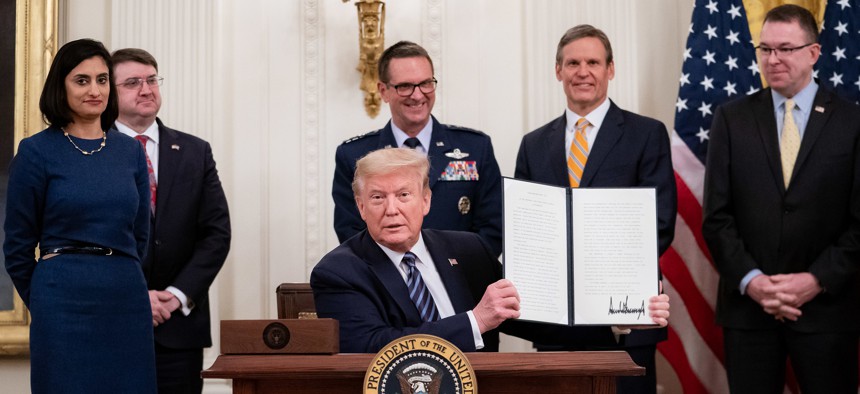Right Now, the Country Needs Experienced Government Leaders, Not Volunteers
The best way to honor public servants is to let them do their jobs.
In recent weeks, volunteers from consulting and private equity firms have stepped up to offer their services to help lead presidential son-in-law Jared Kushner’s effort to coordinate a federal response to the coronavirus pandemic. Their willingness to serve their country in a time of great need is laudable.
It isn’t, however, the best way to address a national crisis. What the country needs right now is the steady, knowledgeable hand of experienced government officials.
The Washington Post reported that Kushner’s volunteers, several of whom have taken vacation time from their private sector jobs to serve as officially designated “special government employees,” were often asked to oversee initiatives with which they had little experience. This was particularly true of the effort to secure personal protective equipment for hospitals across the country.
“The nature and scale of the response seemed grossly inadequate,” one of the volunteers told the New York Times. “It was bureaucratic cycles of chaos.”
Experienced public servants don’t have all the answers, and they often can’t act entirely on their own initiative to address crises. They need clear direction from the top—meaning elected officials and appointees at the highest levels. In situations like this, those officials must challenge government employees to break through “bureaucratic cycles” and make sure the situation doesn’t descend into chaos.
Sometimes, this involves asking people to do what seems impossible. Always, it involves leveraging a deep understanding of how to get things done in the public sector.
That’s what happened when President Clinton appointed John Koskinen, a veteran of several high-profile government positions, to lead the effort to identify and thwart the “Y2K problem” in computer code in the late 1990s.
“As the deputy director for management at the Office of Management and Budget from 1994 to 1997, I helped change the way the government acquired and managed information technology,” Koskinen wrote recently on the blog of the IBM Center for the Business of Government. “I also ran the government shutdowns in 1995, working with every agency to develop a coordinated response to the budget crisis. So, I seemed to be a logical choice. It's possible that I was also the only one willing to take the job.”
Koskinen created the President’s Council on Year 2000 Conversion, worked closely with key federal officials, state and local government representatives, association leaders and private sector executives to systematically come up with a plan to address the looming crisis.
In the end, success came to be widely viewed as the absence of an issue in the first place. “The theme immediately emerged on New Year's Day of 2000 that this had all been an overreaction to a problem that didn't really exist,” Koskinen wrote. “But that view does not reflect the reality of the danger to the world. I don't know anyone who worked on the Y2K problem in a financial institution, a power plant or a telecommunications company who thought they wasted their time or money to make sure the transition went as well as it did.”
Likewise, the response to Hurricane Katrina in 2005 showed the critical importance of leveraging public sector experience to coordinate an effective plan of action. The initial response to the hurricane merely compounded the disaster. It wasn’t until Thad Allen, a longtime Coast Guard officer, was put in command that the situation began to turn around.
“There were forces operating on the scene, including search-and-rescue teams, disaster medical-assist teams, Coast Guard forces, and state and local responders, but they were disconnected and operating in small, self-organized groups,” Allen told National Journal’s James Kitfield in 2006. “Disaster-relief supplies were flowing in, but there was nobody to take control of them and deploy them to where they were needed most. Someone needed to take tactical operational control to organize the relief mission.”
That’s where Allen came in, and drew on all of his experience to lead a whole-of-government response. That approach is much more effective than launching an ad hoc effort that hands over leadership to people who know little about how to make the gears of government work.
The public understands this, and trusts experienced career officials to do their jobs. While only 44 percent of Americans rated President Trump’s efforts to respond to the pandemic positively in a Washington Post/University of Maryland poll this week, public health scientists in the federal government were rated 71 percent positive.
As we celebrate Public Service Recognition Week, the best way to honor those who serve, especially in leadership positions, is to give them the authority they need, challenge them to achieve clear objectives, and let them do their jobs.








